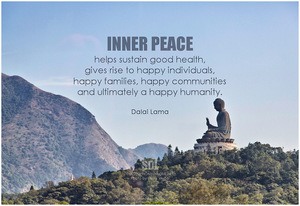His Holiness the Dalai Lama, as usual, has got it right. Any substance addiction will affect your inner peace and health.
Nicotine and alcohol addiction are often linked in people’s minds and may be reflected in their responses to a suggestion that they should stop smoking:
‘I smoke, but I don’t drink’ – so that’s all right then.
‘I only smoke with a drink’ – the ionly smoker.
‘If I give up smoking I suppose you’ll want me to give up drinking as well!’
Although there are similarities between nicotine and alcohol addictions, there are important differences.
Most people can drink as and when they choose, circumstances permitting, and it will never become a problem. However, with smoking, for virtually everyone who does it at all, it’s a problem right from the beginning. This is because virtually all smokers smoke because they’re addicted to the poison nicotine. Whereas with drinking, although the majority will never become addicted to alcohol, a sizeable minority do, with the potential for severe disruption of health, family relationshipsm, and working life.
The reason for this lies in the way alcohol is metabolized by the body, that is, the way it’s broken down in the liver to simpler chemical compounds before being eliminated through the kidneys. I am one of those people who could never become an alcoholic, though I hasten to say I am in no way thereby superior to anyone else. If I drink too much, which I have to admit I have done on rare occasions in the past, one wakes up in the middle of the night with a pounding headache, nausea, and feeling wretched. Depending on the degree of overindulgence these feelings can vary from being relatively mild to wishing one were dead! It’s completely stupid, of course, because it’s self-inflicted and wholly predictable. One is ‘having a good time’, feeling pleasantly intoxicated and there’s the wrong-headed idea that if a little alcohol is nice, more is nicer. The trouble is the dreaded delayed effect – when you realize you’ve had too much it’s too late! Only time brings relief: a few hours, or after a bad binge, perhaps a whole day elapses before one feels human again. During this time of recovery from alcohol poisoning the last thing you want is another drink – the very thought is enough to make you throw up!
In contrast, the actual or potential alcoholic experiences drinking in a rather different way. He or she has a high tolerance for alcohol – can ‘drink other people under the table.’ He doesn’t get drunk as described above, but may become disinhibited and perhaps indulge in uncharacteristic behaviour. Apart from wanting to go on drinking there is not much change in how he feels. Eventually, after a couple of bottles of wine or half a bottle of whiskey (or more), he will fall asleep. On waking he may feel a bit morose, but not all that different from how he usually feels. However, what such drinkers want and are looking forward to, is another drink. If they’re feeling depressed and anxious, they know another dose of alcohol will make them feel better. In the early stages of alcoholism this can wait till evening, a ‘respectable’ drinking time. But as they slip further down the slippery slope they need a drink earlier and earlier in the day in order to relieve the awful feelings of anxiety, shakiness, and black mood. In advanced cases the sufferer starts drinking as soon as she awakes and will go on drinking throughout the day in order to try to stave off the depression, the anxiety, the shakes, and hallucinations that are caused by alcohol withdrawal. Most people do not degenerate to this advanced stage and may remain somewhere in-between heavy social drinking and mild alcoholism, while suffering cumulative damage to their bodies from excessive regular alcohol intake. The organs most affected by alcohol are the liver, the heart, and the brain – three rather important parts of you!
The cure for smoking and alcoholism is the same: total, permanent abstinence. This is much easier for smokers because, if they can be helped to understand why they smoke in the first place, they’ll realize there’s nothing to give up – smoking is utterly pointless. The perceived pleasure that some smokers claim they experience is illusiory.
On the other hand, alcohol for an alcoholic does have some benefits, even if questionable and at a terrible cost: it can help the drinker to reach a state where he can for a few hours escape the miseries of life. There is, therefore, a sacrifice, but it’s a small one. There are advantages, too, in not drinking. Sometimes I have dinner with non-drinking friends. These occasions are no less enjoyable for the absence of alcohol. The pleasure of the event comes from the stimulus of the company one is with. So-called social drinking is as much a convention as anything else. And if you don’t drink alcohol with dinner at a restaurant, you can drive yourself home afterwards and the bill is much cheaper!
Text © Gabriel Symonds


Leave A Comment